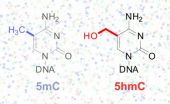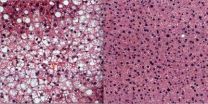When you eat matters, not just what you eat
2012-05-18
(Press-News.org) When it comes to weight gain, when you eat might be at least as important as what you eat. That's the conclusion of a study reported in the Cell Press journal Cell Metabolism published early online on May 17th.
When mice on a high-fat diet are restricted to eating for eight hours per day, they eat just as much as those who can eat around the clock, yet they are protected against obesity and other metabolic ills, the new study shows. The discovery suggests that the health consequences of a poor diet might result in part from a mismatch between our body clocks and our eating schedules.
"Every organ has a clock," said lead author of the study Satchidananda Panda of the Salk Institute for Biological Studies. That means there are times that our livers, intestines, muscles, and other organs will work at peak efficiency and other times when they are—more or less—sleeping.
Those metabolic cycles are critical for processes from cholesterol breakdown to glucose production, and they should be primed to turn on when we eat and back off when we don't, or vice versa. When mice or people eat frequently throughout the day and night, it can throw off those normal metabolic cycles.
"When we eat randomly, those genes aren't on completely or off completely," Panda said. The principle is just like it is with sleep and waking, he explained. If we don't sleep well at night, we aren't completely awake during the day, and we work less efficiently as a consequence.
To find out whether restricted feeding alone—without a change in calorie intake—could prevent metabolic disease, Panda's team fed mice either a standard or high-fat diet with one of two types of food access: ad lib feeding or restricted access.
The time-restricted mice on a high-fat diet were protected from the adverse effects of a high-fat diet and showed improvements in their metabolic and physiological rhythms. They gained less weight and suffered less liver damage. The mice also had lower levels of inflammation, among other benefits.
Panda says there is reason to think our eating patterns have changed in recent years, as many people have greater access to food and reasons to stay up into the night, even if just to watch TV. And when people are awake, they tend to snack.
The findings suggest that restricted meal times might be an underappreciated lifestyle change to help people keep off the pounds. At the very least, the new evidence suggests that this is a factor in the obesity epidemic that should be given more careful consideration.
"The focus has been on what people eat," Panda said. "We don't collect data on when people eat."
###
Hatori et al.: "Time-Restricted Feeding without Reducing Caloric Intake Prevents Metabolic Diseases in Mice Fed a High-Fat Diet."
END
ELSE PRESS RELEASES FROM THIS DATE:
2012-05-18
Research to be published in Science on May 18, 2012, sheds light on a hot-button political issue: the role and effectiveness of government regulation. Does it kill jobs or protect the public?
The new study, co-authored by Harvard Business School Professor Michael Toffel, Professor David Levine of the Haas School of Business at the University of California, Berkeley, and Boston University doctoral student Matthew Johnson, examines workplace safety inspections conducted by California's Division of Occupational Safety and Health (Cal/OSHA). The authors carried out the first ...
2012-05-18
ANN ARBOR, Mich.--- Across history and cultures, religion increases trust within groups but also may increase conflict with other groups, according to an article in a special issue of Science.
"Moralizing gods, emerging over the last few millennia, have enabled large-scale cooperation and sociopolitical conquest even without war," says University of Michigan anthropologist Scott Atran, lead author of the article with Jeremy Ginges of the New School for Social Research.
"Sacred values sustain intractable conflicts like those between the Israelis and the Palestinians ...
2012-05-18
The strategy used by Google to decide which pages are relevant for a search query can also be used to determine which proteins in a patient's cancer are relevant for the disease progression. Researchers from Dresden University of Technology, Germany, have used a modified version of Google's PageRank algorithm to rank about 20,000 proteins by their genetic relevance to the progression of pancreatic cancer. In their study, published in PLoS Computational Biology, they found seven proteins that can help to assess how aggressive a patient's tumor is and guide the clinician ...
2012-05-18
###
Weill Cornell Medical College
Weill Cornell Medical College, Cornell University's medical school located in New York City, is committed to excellence in research, teaching, patient care and the advancement of the art and science of medicine, locally, nationally and globally. Physicians and scientists of Weill Cornell Medical College are engaged in cutting-edge research from bench to bedside, aimed at unlocking mysteries of the human body in health and sickness and toward developing new treatments and prevention strategies. In its commitment to global health and ...
2012-05-18
In two back-to-back reports published online on 17 May in Cell, researchers have sequenced the genomes of 21 breast cancers and analysed the mutations that emerged during the tumours' development. The individual results are described below.
Led by researchers from the Wellcome Trust Sanger Institute, the team created a catalogue of all the mutations in the genomes of the 21 cancer genomes and identified the mutational processes that lead to breast cancer. They found that these mutations accumulate in breast cells over many years, initially rather slowly, but picking up ...
2012-05-18
Researchers at the SIB Swiss Institute of Bioinformatics and the EMBL-European Bioinformatics Institute have confirmed the long-held conjecture that studying the genes we share with other animals is a viable means of extrapolating information about human biology. The study, published in the open access journal PLoS Computational Biology, shows how bioinformatics makes it possible to test the conjecture.
Scientists have long looked to model species – mice, for example – to understand human biology. This is at the root of what is called the 'ortholog conjecture': the idea ...
2012-05-18
Imagine reading an entire book, but then realizing that your glasses did not allow you to distinguish "g" from "q." What details did you miss?
Geneticists faced a similar problem with the recent discovery of a "sixth nucleotide" in the DNA alphabet. Two modifications of cytosine, one of the four bases that make up DNA, look almost the same but mean different things. But scientists lacked a way of reading DNA, letter by letter, and detecting precisely where these modifications are found in particular tissues or cell types.
Now, a team of scientists from the University ...
2012-05-18
VIDEO:
This is an interview with Dr. Panda.
Click here for more information.
LA JOLLA, CA----It turns out that when we eat may be as important as what we eat. Scientists at the Salk Institute for Biological Studies have found that regular eating times and extending the daily fasting period may override the adverse health effects of a high-fat diet and prevent obesity, diabetes and liver disease in mice.
In a paper published May 17 in Cell Metabolism, scientists from Salk's ...
2012-05-18
Researchers at the SIB Swiss Institute of Bioinformatics and the EMBL-European Bioinformatics Institute have confirmed the long-held belief that studying the genes we share with other animals is useful. The study, published today in the open access journal PLoS Computational Biology, shows how bioinformatics makes it possible to test the fundamental principles on which life science is built.
Studying genes helps life science researchers understand how our bodies work and how diseases progress. Scientists have long looked to model species – mice, for example – to understand ...
2012-05-18
Technology is helping communication companies merge telephone, television and Internet services, but a push to deregulate may leave some customers on the wrong side of the digital divide during this convergence, according to a Penn State telecommunications researcher.
"Moving away from copper lines is an example of abandoning obsolete technology and embracing technology that is faster, better, cheaper and more convenient," said Rob Frieden, Pioneers Chair in Cable Television and professor of telecommunications and law. "But the risk is that we may be creating a digital ...
LAST 30 PRESS RELEASES:
[Press-News.org] When you eat matters, not just what you eat

